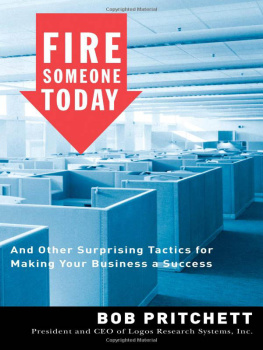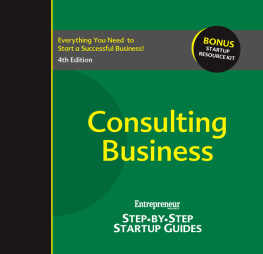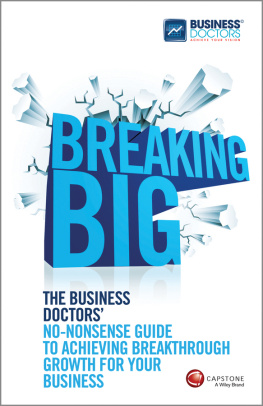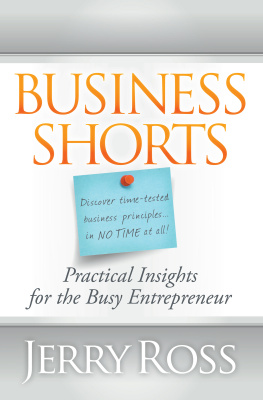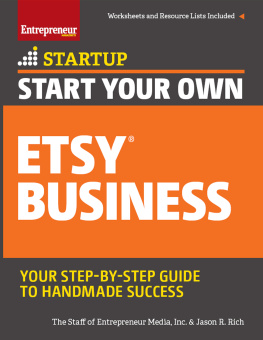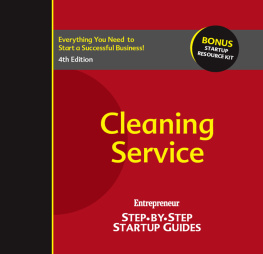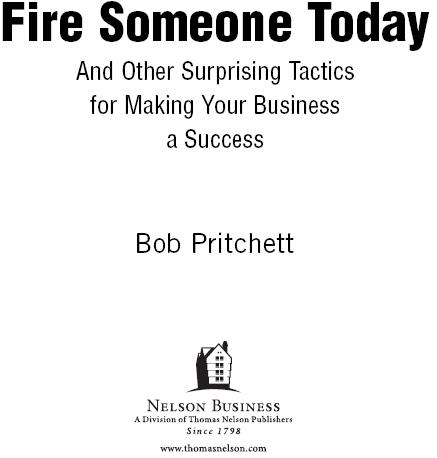
Copyright 2006 by Bob Pritchett
All rights reserved. No portion of this book may be reproduced, stored in a retrieval system, or transmitted in any form or by any meanselectronic, mechanical, photocopy, recording, scanning, or otherexcept for brief quotations in critical reviews or articles, without the prior written permission of the publisher.
Published in Nashville, Tennessee, by Thomas Nelson, Inc.
Nelson Books titles may be purchased in bulk for educational, business, fund-raising, or sales promotional use. For information, please e-mail SpecialMarkets@ThomasNelson.com.
This book does not constitute legal advice. The author is not an attorney. Every business situation is unique, and laws differ by jurisdiction. This book should not be used as a substitute for competent legal counsel specific to your location and circumstances.
Pritchett, Bob, 1971
Fire someone today / Bob Pritchett.
p. cm.
Includes bibliographical references.
ISBN 0-7852-1262-0 (pbk.)
1. Small businessManagement. 2. Executive ability. 3. Leadership. I. Title.
HD62.7.P745 2006
658.02'2dc22
2005030055
Printed in the United States of America
06 07 08 09 10 RRD 5 4 3 2 1
Table of Contents
Entrepreneurs are the underappreciated heroes of civilization. Virtually every advance in art or science has been either in the service of business or has reached us through the work of an entrepreneur.
Entrepreneurs are the people who publish and promote the artists. Entrepreneurs are the people who make the results of accidental discoveries available to everyone. Entrepreneurs are the people who seek out new and better solutions.
Writing was developed to keep business records. The seas and continents were explored in order to find new business opportunities. In pursuit of profit, entrepreneurs have given us the steam engine, the electric light, and one-hour dry cleaning.
The march of progress has been to the beat of the business drum. Entrepreneurs are the drummers.
Being an entrepreneur is the greatest job on earth.
Small Business Is Hard Work
The greatest job on earth is a very hard job. The people who are starting and running businesses are, quite literally, running the world. And that takes a lot out of you.
The world is not run by the United Nations. The world is not run by the president of the United States. The world is run by the people who run the businesses that milk the cows, build the widgets, drive the trucks, and sell the goods.
Wal-Mart, General Motors, and the rest of the Fortune 500 do a lot of the heavy lifting. But small businesses have a harder job.
Big businesses are huge machines. They are well documented, well staffed, and they know what to do and how to do it. Yes, they are complex. Yes, they can fail. But, for the most part, the people running them understand how the machines work and have the resources to keep them going.
Small businesses, and the entrepreneurs and business owners who run them, are building new business machines. These new machines are a lot harder to operate than the big established businesses. Small businesses are
growing faster. Changes in revenue, number of employees, etc., are occurring at a breakneck pace in small businesses.
innovating more. Large businesses may invent new products, services, and processes too, but they do not have to invent their business model and processes on the fly.
taking bigger risks. Small businesses are financed with credit cards, personal guarantees, and loans from family and friends. Starting a small business is not just a risky career step; it is a risky life step.
Small businesses do not come with an instruction manual. The small business leader has no guideline for operations, no procedure to follow, no boss to consult, and no leadership training institute at the posh corporate retreat center.
Small business leaders have to find their own help. And some of the best help is the experience of others. Thats what I have to offer.
Who I Am
I am an entrepreneur. I am actively leading Logos Research Systems, Inc., a business I cofounded more than a decade ago. At the time of this writing, we have around ninety employees and $9 million in sales, a subsidiary in South Africa, and hundreds of thousands of customers in more than 140 countries.
I have purchased several companies and negotiated to sell my own. I have raised money from family and friends and through a formal private placement. I have a partner and minority shareholders. I took my company through an initial public offering and then canceled and unraveled the deal before we broke escrow.
I have lived through years of 100% growth and years in which we shrank. I have had to lay off people. I have had a million dollars in the bank account, and I have been overdrawn and owing a million.
I am not a professional speaker. I do not write business books for a living. I am not an angel investor, venture capitalist, or business consultant. I am not an academic trying out new business theories. And I do not have an MBA.
I have made a lot of big mistakes. From them, at last, I have learned enough to see strength, stability, and success in my business. And I am not done yet: the business is still growing, and I am still making mistakes.
I will never run a billion-dollar business. The business Im in doesnt have a big market, and I am okay with that. I will not do whatever it takes to get ahead. Though I fail sometimes, I try to put my faith, my marriage, and my family ahead of my ambition.
I am telling you all of this to establish my credentials for writing this book: I am not a celebrity CEO. I am not a one-in-a-million business genius. I am not on the outside looking in. I am the guy down the street who is working hard, running a pretty good business, and who has learned some lessons that may help you too.
The Purpose of This Book
In my travels down the entrepreneurial road, I have been blessed in many ways. I have gotten a lot of good advice. I have read a lot of good material. I have learned from the experiences of others. And, most importantly, the mistakes I have made were bad enough to teach me valuable lessons but not bad enough to kill my business. (It was a very fine line.)
The purpose of this book is to share some of what I have learned with you, my fellow entrepreneur, business leader, and hero of civilization.
This book is not intended to be inspirational. It is intended to be useful. It is not full of business platitudes or step-by-step how-to advice. If you want to be told that if you dream it, you can do it, get another book. If you want to know how to write a business plan, dont look here. I do not have Thirteen Incontrovertible Laws of Excellence.
This book is about what to do, what not to do, and why. (Names and details about many of the people who appear in this book have been changed to protect the innocent. And the guilty.)
When my business was just starting up, I knew a guy who worked for a lawn care service and was participating in a multilevel marketing business. Every time I ran into him he wanted to talk business, which to him meant parroting phrases from motivational tapes.
There is nothing better than to wake up in the morning, look into the mirror, and say, Hi, boss! he said.
What are you talking about, you soap-peddling, wannabe entrepreneur? You spend your day cutting lawns for someone elses business. When I look into the mirror, I ask, Are we going to meet payroll? I replied.
Okay, not really. I said, Youre right.
It is great to be the boss. There are some nice perks to being an entrepreneur. But it is often a hard, lonely, and frightening responsibility.
Next page
